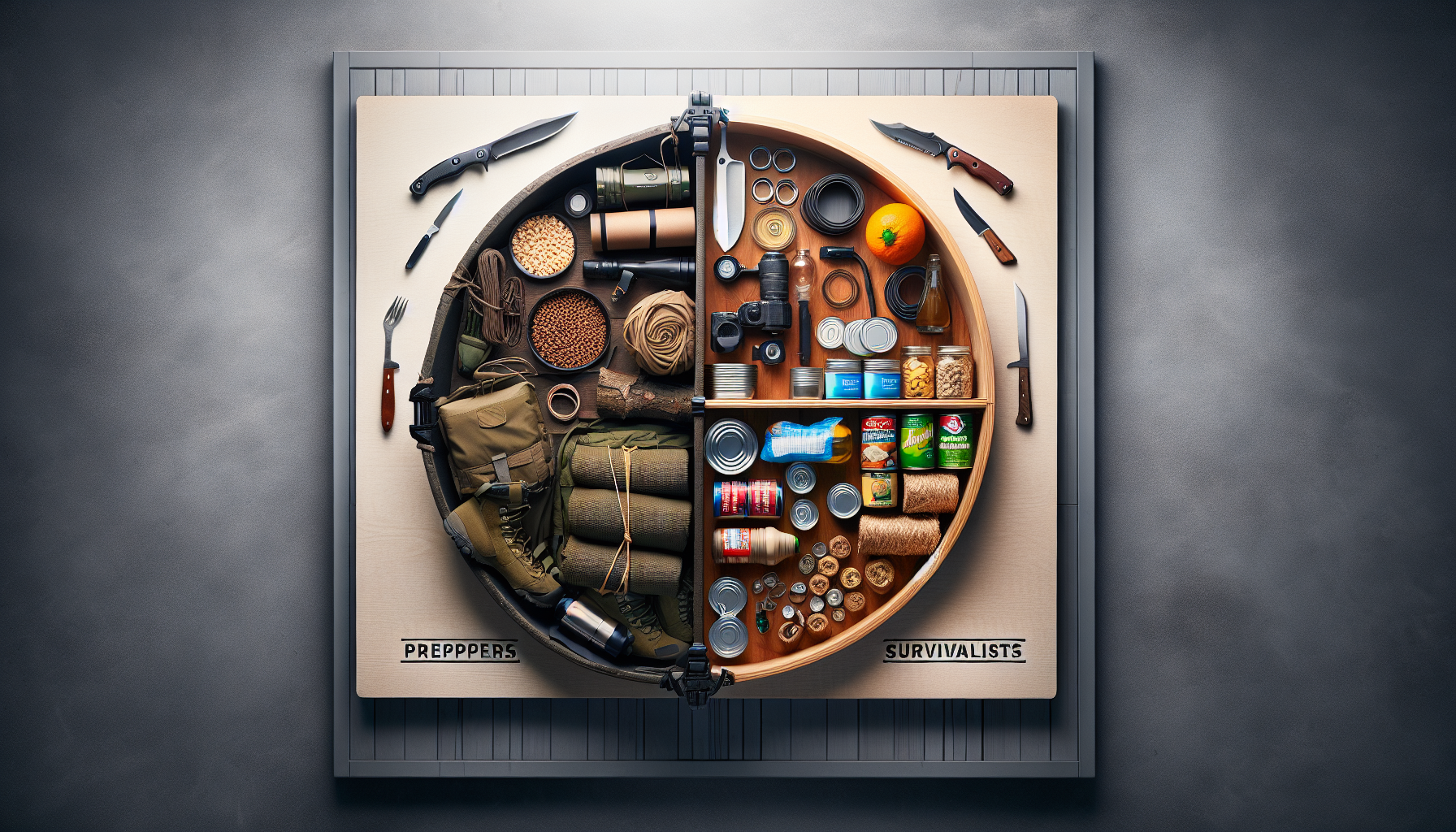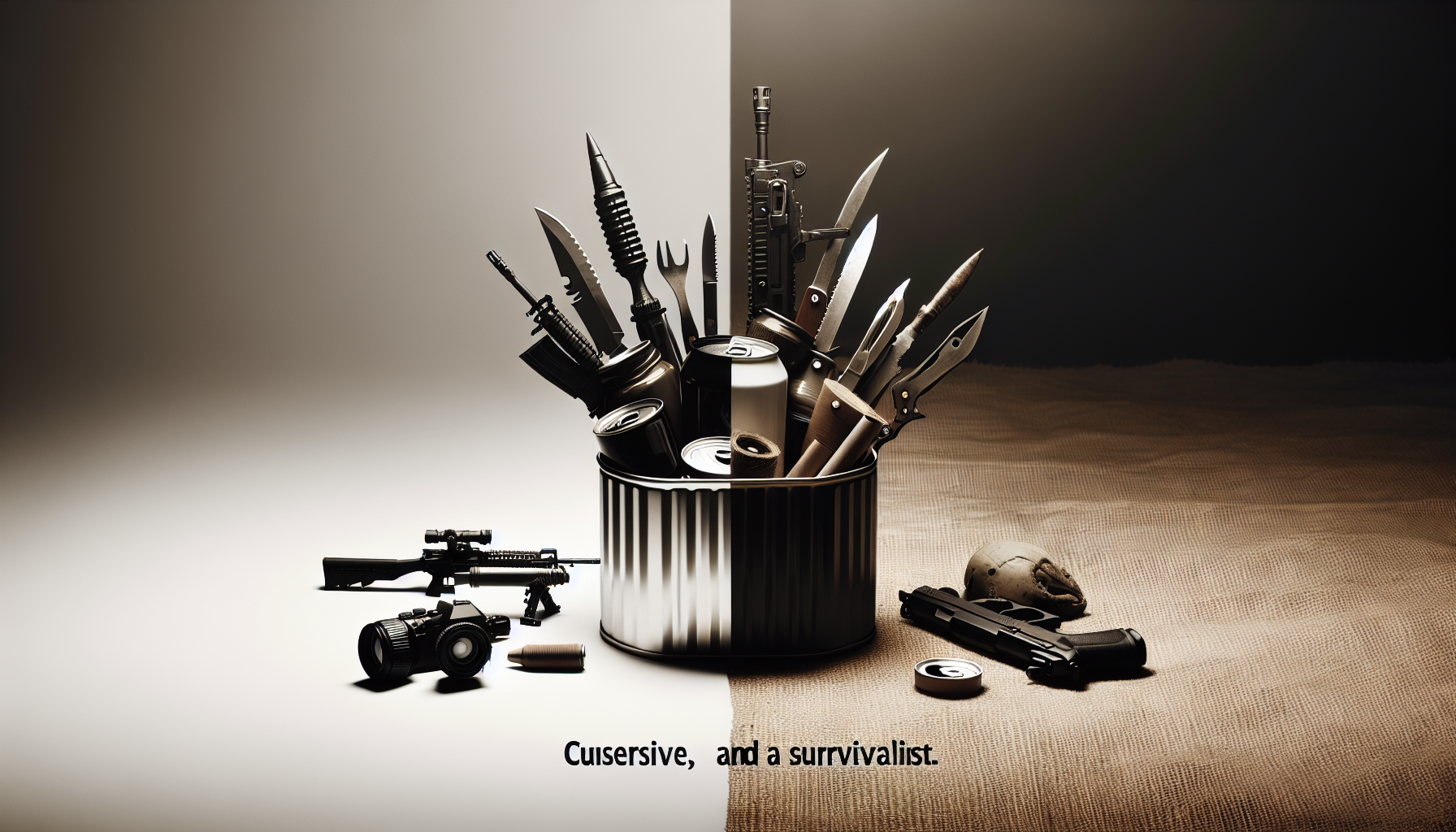In the world of emergency preparedness, two terms often come up: prepper and survivalist. While these terms are used interchangeably by many, there are subtle differences that set them apart. A prepper is someone who actively prepares for potential disasters, stocking up on supplies and learning necessary skills, with the goal of being self-sufficient during challenging times. On the other hand, a survivalist takes this preparation to another level, often focusing on learning wilderness survival skills and honing their ability to live off the land. Though both preppers and survivalists share a common goal of being prepared for uncertain situations, their approaches and priorities may differ.
Prepper vs Survivalist
When it comes to preparing for potentially challenging situations, two terms often come to mind: prepper and survivalist. While both share the common goal of being self-sufficient and prepared for emergencies, there are distinct differences between the two. In this article, we will explore the defining characteristics of preppers and survivalists, their focuses, their timelines for preparation, their skillsets, their approach to self-sufficiency, their community involvement, their choice of equipment and supplies, their attitudes and mindsets, and how they are portrayed in the media.
Defining Preppers
Preppers are individuals who prioritize being ready for unforeseen events that may disrupt their daily lives. They take a proactive approach to preparedness and focus on building a stockpile of essential resources to sustain themselves and their families. Preppers believe in being well-equipped and well-prepared for a wide range of emergencies, such as natural disasters, economic instability, or societal breakdowns.
Defining Survivalists
Survivalists, on the other hand, take preparedness to the next level. They aim to acquire the skills necessary to thrive in extreme situations and rely less on stockpiling resources. Survivalists emphasize learning wilderness survival skills, such as foraging, hunting, and shelter-building. They focus on adapting to their surroundings and developing a deep understanding of the natural environment around them.
Preparation Focus
Prepper’s Focus
Preppers place significant emphasis on amassing a diverse range of supplies and resources. Their focus is on stockpiling food, water, medical supplies, and other essential items. They strive to create a self-sufficient environment within their homes, where they can ride out potential emergencies comfortably. This approach allows preppers to provide for themselves and their families during short-term disruptions.
Survivalist’s Focus
Survivalists, on the other hand, prioritize developing skills and knowledge rather than relying solely on physical resources. They focus on honing survival skills such as fire-making, navigation, and self-defense. Survivalists also pay close attention to physical fitness, knowing that their bodies must be prepared to endure demanding situations that may arise in the wild or during prolonged periods of uncertainty.

Timeframe
Short-term Preparations
Preppers typically focus on short-term emergency scenarios that may last for a few weeks to a few months. Their preparations are geared towards surviving temporary disruptions in the infrastructure, such as power outages, severe weather events, or short-term supply chain interruptions. Their goal is to have enough supplies to sustain their families until normalcy is restored.
Long-term Preparations
Survivalists take a long-term approach to preparedness, considering scenarios where access to modern conveniences may be permanently compromised. They anticipate situations such as economic collapse, long-lasting natural disasters, or other catastrophic events that may disrupt society for an extended period. Thus, survivalists dedicate their efforts to developing skills and gathering resources that will support them for the long haul.
Skills and Knowledge
Prepper’s Skills
Preppers tend to focus on practical skills that can be utilized within their immediate environment. These skills include gardening, food preservation techniques, first aid and medical training, home repair, and alternative energy generation. By acquiring these skills, preppers gain the ability to be self-reliant and maintain a sense of normalcy during challenging times.
Survivalist’s Skills
Survivalists prioritize learning skills that can be applied in the great outdoors and in remote locations. These include bushcraft, wilderness survival skills, tracking, hunting, fishing, and primitive tool-making. Survivalists believe in being adaptable and capable of thriving in any natural environment, relying on their knowledge and resourcefulness rather than modern conveniences.

Self-sufficiency
Prepper’s Self-sufficiency
Preppers aim to create a self-sufficient lifestyle within their own homes or communities. They invest in renewable energy systems, such as solar panels or small wind turbines, and practice off-grid living techniques. Preppers often focus on building sustainable gardens or raising livestock to provide a steady supply of food. The goal is to reduce their reliance on outside resources and create a sense of self-sufficiency within their own environment.
Survivalist’s Self-sufficiency
Survivalists focus on being self-sufficient under more extreme circumstances, such as being in the wilderness or in a post-apocalyptic world. They prioritize survival techniques that require minimal reliance on modern technology. By utilizing their knowledge of wild edible plants, water purification methods, and natural shelters, survivalists aim to be independent and self-reliant in any situation.
Community Involvement
Prepper’s Community Involvement
Preppers often prioritize fostering a sense of community and cooperation among like-minded individuals. They believe in sharing knowledge, resources, and skills within their local prepper groups or communities. Preppers understand the importance of coming together during challenging times and value the support and collaboration that strong community ties bring.
Survivalist’s Community Involvement
Survivalists, due to their focus on individual skills and self-reliance, may not place as much emphasis on community involvement. While some survivalists do seek out like-minded individuals and join survivalist groups, the emphasis is primarily on individual preparedness rather than communal support.
Equipment and Supplies
Prepper’s Equipment and Supplies
Preppers stockpile a wide array of essential items such as non-perishable food items, water filters, medical supplies, tools, and communication devices. They ensure they have a sufficient amount of these resources to last them through the anticipated duration of the emergency or disruption. Additionally, preppers invest in backup power generators, alternative cooking methods, and other equipment that enhances their ability to maintain a comfortable living environment.
Survivalist’s Equipment and Supplies
Survivalists focus on acquiring lightweight, portable gear suitable for wilderness survival. They prioritize items such as knives, fire starters, water purification tablets, lightweight cooking equipment, and durable clothing suitable for outdoor conditions. Survivalists aim to carry supplies that can sustain them during a prolonged period in the wilderness and maximize their mobility.
Approach to Disasters
Prepper’s Approach
Preppers tend to approach disasters from a proactive standpoint, attempting to foresee potential threats and prepare for them in advance. They often create detailed emergency plans, including evacuation routes, designated meeting points, and contact lists. Preppers also focus on accumulating resources to ensure their families’ well-being during times of crisis, minimizing the impact of disruptions and moving towards recovery as quickly as possible.
Survivalist’s Approach
Survivalists acknowledge that disasters or extreme situations can be unpredictable and may require quick adaptation without the luxury of prior preparation. They focus on developing the skills necessary to navigate through crises, relying on their abilities to find food, water, and shelter in a variety of environments. Survivalists prioritize mental toughness, adaptability, and resourcefulness to face unexpected challenges head-on.
Attitude and Mindset
Prepper’s Attitude and Mindset
Preppers maintain a cautious yet optimistic attitude towards preparedness. They believe in being informed about potential threats, recognizing the importance of taking steps to protect themselves and their loved ones. Preppers tend to approach preparedness as a lifestyle choice, consistently working towards being ready for any eventuality. They believe that being prepared provides peace of mind and a sense of security.
Survivalist’s Attitude and Mindset
Survivalists adopt a more rugged and independent mindset towards preparedness. They believe in being adaptable and self-reliant, always striving to learn new skills and test their own limits. Survivalists embrace challenges and the opportunity to prove their abilities, viewing preparedness as a way of life rather than a mere precautionary measure.
Media Portrayal
Prepper in Media
The media often portrays preppers as individuals who are overly cautious, even paranoid, about potential disasters. They are frequently depicted as stockpiling resources to an excessive extent and often associated with extreme scenarios such as a zombie apocalypse. While these portrayals may not accurately represent the diverse range of preppers, they have contributed to the popularized perception of preppers as non-conformists.
Survivalist in Media
Survivalists, like preppers, often face stereotyping in the media. They are sometimes portrayed as loners or extremists living on the fringes of society, embracing self-sufficiency to an extreme degree. However, some media outlets also highlight survivalists’ valuable skills and showcase their ability to thrive in challenging environments. Overall, the media’s depiction of survivalists varies, often capturing only certain aspects of their lifestyle.
In conclusion, while preppers and survivalists share a common goal of preparedness, their approaches and areas of focus differ significantly. Preppers prioritize stockpiling resources, fostering community, and creating self-sufficiency within their homes, while survivalists focus on developing wilderness survival skills and adaptability. Both preppers and survivalists, despite media portrayals, are motivated by a desire to be self-reliant and ready for whatever challenges life may present.
